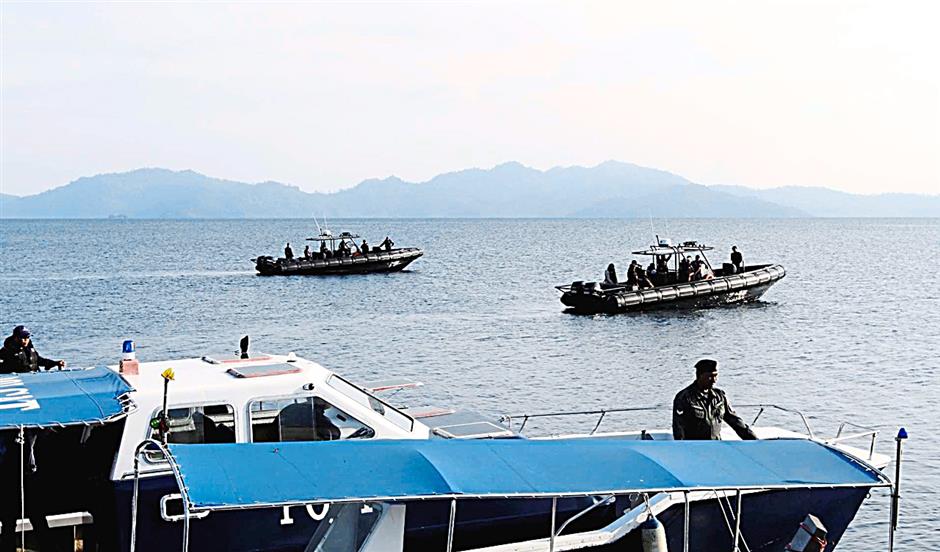JAKARTA (The Jakarta Post/ANN) - The government has lambasted the "ineffective coordination" of Malaysian authorities following the abduction of five Indonesian fishermen last week in waters off Sabah, the latest incident to underscore the lack of security in the tri-border area between Malaysia, Indonesia and the Philippines.
Six members from a faction of the notorious Abu Sayyaf militant group abducted on Thursday five Indonesian fishermen from their trawler in Sabah's easternmost waters off Lahad Datu, about 10 minutes from the Tawi-Tawi chain of islands in the southern Philippines.
Indonesian Deputy Foreign Minister Mahendra Siregar said Monday that the government would work swiftly to take the necessary steps to handle the fresh kidnappings to ensure the safety of the hostages. He also expressed disappointment in the inability of Malaysia's authorities to secure its borders.
"We truly regret that these sorts of incidents keep repeating. It seems to have been caused by ineffective coordination among Malaysian authorities, among other things," Mahendra told reporters at the House of Representatives complex in Jakarta on Monday.
"We hope this is improved quickly."
The hostages were part of an eight-man crew aboard a Sabah-registered fishing vessel, before armed gunmen took them to the southern Philippines.
Security forces under the Eastern Sabah Security Command (Esscomm) were alerted to the incident by other fishermen at 1 p.m. on Friday and immediately carried out a search operation while alerting their Philippine counterparts.
Philippine security forces reportedly gunned down an Abu Sayyaf militant believed to be involved in the kidnapping. Regional intelligence sources said the gunmen were currently on the run with the hostages from the pursuing military forces, The Star reported.
"Currently, the government is coordinating with counterparts in the Philippines as it has now become the domain of Philippine authorities," Mahendra said. He had also asked Malaysia to strengthen its commitment to protecting Indonesian fishermen operating in its waters.
The Malaysian Embassy in Jakarta was not immediately available for comment.
The Abu Sayyaf group, a loose association of militants who kidnap for ransom and operate out of the southern islands of the Philippines, began targeting Indonesian sailors in 2016. As many as 39 people had been abducted before Thursday's incident, although the government has denied claims it has paid the ransom demands.
Terrorism analyst Ali Wibisono of the University of Indonesia argued that there was a historical sentiment among the militants in the southern Philippines that could explain why they were often emboldened to act out in the areas near Sabah.
The Philippine militant group, which Ali said had roots among the Moro people of the region, believed Sabah was part of the territory taken from it in past conflicts.
"Other factors include recent improvements in [Philippine President Rodrigo] Duterte's security operations to eradicate the Abu Sayyaf group. On the other hand, Malaysia is still trying to cover the large area of Sabah's waters with their limited [capacity]," Ali said on Monday.
Separately, Institute for Policy Analysis and Conflict director Sidney Jones said that findings from a forthcoming study by the think tank point to the fact that Indonesian fishermen that live and work in and around Sabah were subservient to Malaysian boat owners.
"The decision to set sail for fishing and the time spent out at sea is decided by the towkay [boat owners], not the fishermen," she told The Jakarta Post on Monday.
"It is important to note that Malaysia's security authority [Esscomm] has imposed a curfew for all seafarers to cease all maritime activity in the area between 6 p.m. to 6 a.m. to mitigate the risk of Abu Sayyaf kidnappings. However, some abductions have still taken place during the curfew period – at times when the boat owners [often] instruct the fishermen [to sail]," she explained.
The string of Abu Sayyaf abductions has prompted Indonesia, Malaysia and the Philippines to form a trilateral cooperation initiative that includes coordinated maritime patrols and other cross-border arrangements. Indonesia has previously hit out at Malaysia for similar lapses in security.
Jones urged the Indonesian government to continue working closely with its Malaysian and Philippine counterparts, underlining that the trilateral patrols had failed to prevent more incidents and that they were not necessarily the right solution to the kidnappings.
She said the kidnappers could easily avoid the patrols and hide among the hundreds of uninhabited islands that stretch from Sabah to Tawi-Tawi in the Philippines. - The Jakarta Post/ANN


No comments:
Post a Comment